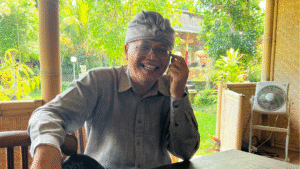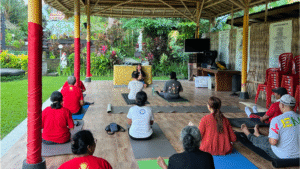16-year-old Lola interviews the man bringing joy to Balinese people through laughter yoga

Lola Kadas (left) and Kadek Siwa Ambara at his Ambara Ashram in Ubud, Bali.
Picture courtesy of: Lola Kadas
Article link copied.
“Happiness is the medicine”: this is the philosophy by which Indonesian laughter yoga guru Kadek Siwa Ambara lives, builds his career and connects with others. One morning this summer, I had the privilege of sitting down with him in his yoga studio, Ambara Ashram, in Ubud, Bali, to learn about his thoughts, teachings and the journey that shaped him.
We sat on his tranquil patio, surrounded by tropical plants and the sound of birds. Ambara, wearing his signature round glasses, grey shirt and traditional headdress, leaned comfortably into his chair, smiling warmly. That smile never seemed to leave his face.
Our conversation began with him explaining how even just the physical act of smiling can make a person happier and more relaxed. After a few minutes, he asked me to do something unexpected: to try being sad while smiling.
Harbingers’ Weekly Brief
After several awkward attempts, I laughed and admitted: it was impossible. Ambara laughed too while rocking his shoulders and nodded as if to say, you see? From that moment, I was hooked – eager to learn not just about laughter yoga, but about what it means to live with such joy and intention.
Bringing laughter yoga to Bali
Though Ambara introduced laughter yoga to Indonesia, the practice itself was founded by Dr Madan Kataria, a physician from Mumbai, India, in 1995. After meeting Dr Kataria in person, Ambara started his own laughter yoga practice in 2007.
According to Ambara, laughter yoga has numerous benefits: it boosts mood, enhances quality of life and helps people to cope with hardship. By increasing oxygen flow through controlled laughter, it also supports the parasympathetic nervous system, the body’s natural de-stressing mechanism.
Today, laughter yoga is available in more than 110 countries and has reached millions through YouTube videos and social media.


Laughter yoga guru Kadek Siwa Ambara.
Picture by: Lola Kadas
A laughter yoga session at Ambara Ashram in Bali.
Picture by: Lola Kadas
Before popularising laughter yoga in Bali, Ambara founded the Taman Permata Hati orphanage in 1995, which continues to support children today. Five years later, he created a centre for meditation and wellness, later introducing laughter yoga.
The yoga tertawa (‘laughter yoga’ in Indonesian) community is now Bali’s largest yoga network. Ambara’s group has hosted two major events: ‘Bali Laughs’ in 2019, which gathered 10,000 participants, and ‘Elderly Laugh’ in 2023, which brought together 9,999 people in a powerful celebration of joy and connection. Both milestones were recognised by the Indonesian World Records Museum (MURI).
Spiritual journey
From the moment he sat down to speak with me, Ambara’s gentle smile eased any nerves I had before the interview. His welcoming presence made me feel instantly relaxed.
When I asked about his philosophy of life, he began to sing: “Here happy, there happy, everywhere happy!” – lyrics from a traditional Balinese song, translated into English.
His joy and enthusiasm were infectious. By the end of the song, we were both laughing.
Ambara’s story starts in Ubud, where his family were involved with one of the most significant temples of protection. His grandfather was a pemangku (a holy man who leads temple ceremonies) and also a talented architect and woodcarver. As a child, Ambara recalls his grandfather sharing stories “related to spirituality” and reminding him “to do the best for yourself, for your family and other people”.
At university, Ambara studied Indonesian Language and went on to build a successful career in carpentry. Yet despite his financial success, he often found himself overwhelmed and plagued with headaches.
Seeking peace, he turned to yoga and meditation, and these practices eventually transformed his life. He opened the orphanage, followed the laughter yoga centre, and the rest is history.
How to be happy?
The next day, I returned to Ambara Ashram to see laughter yoga in action.
Around 15 people sat together, led by a trained instructor who guided them through a series of playful exercises that brought enjoyment and laughter. Sessions also include motivational affirmations, meditation and traditional yoga exercises.
The session began with simple breathing techniques, similar to meditation, followed by rhythmic clapping in a 1-2, 1-2-3 pattern while chanting “ho-ho, ha-ha-ha”. At first, it looked undeniably silly. But that, I soon realised, was the point – to release the fear of judgement and “leave your ego at the door,” as Ambara says. Within minutes, giggles turned into full laughter that filled the open-air studio.
Watching the group laugh together, leaving their worries and judgements behind, I understood why everyone in the room seemed so free. Even as an observer, I felt lighter, energised and cheerful.
In a world where it is easy to feel overwhelmed, Ambara’s message stays with me: “How to be happy? Gratitude. Smiling. Singing a song. Dancing. Laughing.”
Simple words, perhaps – but in his presence they felt like pure wisdom.
Written by:

Society Section Editor 2025
Budapest, Hungary
Born in 2009 in Budapest, Hungary, Lola has lived in Budapest and California, US. She is interested in music, pop culture, politics, and mental health, and plans to study psychology.
Lola joined Harbingers’ Magazine in the summer of 2024 as a contributor during the Oxford Pop-up Newsroom. After completing the newsroom and the Essential Journalism Course, she became a writer in the autumn of the same year, covering society and public affairs. Her strong writing skills and dedication to the magazine led to her promotion to Society Section Editor in 2025.
In her free time, Lola plays guitar, piano, and volleyball, enjoys going to concerts, and creates various types of studio art. She is also a fan of Taylor Swift’s music.
Lola speaks English, Hungarian, French, and Spanish.
Edited by:

🌍 Join the World's Youngest Newsroom—Create a Free Account
Sign up to save your favourite articles, get personalised recommendations, and stay informed about stories that Gen Z worldwide actually care about. Plus, subscribe to our newsletter for the latest stories delivered straight to your inbox. 📲
© 2026 The Oxford School for the Future


